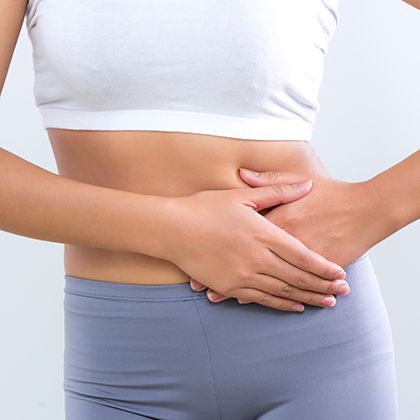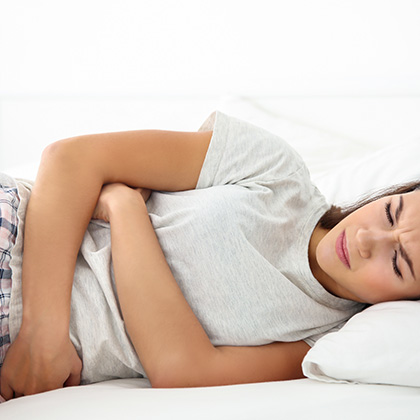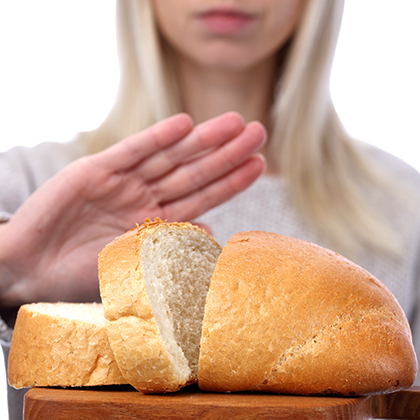
It might not be the kind of thing most people want to talk about, but constipation is a very common problem. According to the NHS, one in seven adults and one in three children in the UK has constipation at any one time (read Constipation in children: causes, symptoms and treatments for more information), with twice as many women affected than men. Older adults and pregnant women are also more likely to have constipation than others (i).
Constipation means not being able to empty your bowel as regularly or as completely as usual, and straining to pass hard or lumpy stools, which can be painful and uncomfortable. Most of the time it’s nothing to worry about and your symptoms may last for a few days or so. If, however, your symptoms last for more than a week, you’re classed as having chronic constipation. In many of these long-term cases, constipation can cause significant discomfort and affect sufferers’ day-to-day lives.
What causes constipation in one person may vary from what causes it in another. However there are several likely triggers, including the following:
-
Eating a diet that’s low in fibre (though some people with severe constipation find eating more fibre can actually make their symptoms worse)
-
Not drinking enough water and other fluids
-
Drinking too much coffee (or other foods and drinks that contain caffeine)
-
Eating certain foods such as chocolate, dairy products, red meat and unripe bananas
-
Having a sedentary lifestyle (exercise helps your digestive system to work more efficiently)
-
Feeling stressed out (a high level of stress is widely acknowledged as affecting your digestive system) or being affected by anxiety or depression
-
Changing your eating habits (eating different foods at different times while on holiday, for instance)
-
Taking certain medicines (antacids and iron supplements, to name just a few examples)
-
Putting off going to the toilet when you need to
-
Having a raised temperature
Pregnancy hormones
Constipation is very common in pregnancy. That’s because during pregnancy, your body produces higher levels than usual of a hormone called progesterone. This hormone relaxes the muscles, which means the muscles in your digestive system may also become less efficient, leading to a backed-up bowel. The majority of cases of constipation during pregnancy are affected during the earlier stages. But many women also find that as their baby starts to grow, it puts more and more pressure on their bowel, which can also cause the symptoms of constipation.
A change in your diet may play a part in constipation during pregnancy too, especially if you experience food cravings or aversions to foods you used to eat without any problem. And if you’re diagnosed with iron-deficiency anaemia while you’re expecting, taking a course of iron supplements may also cause constipation symptoms.
Lifestyle tips to prevent constipation
When it comes to constipation, the good news is there’s lots you can do to treat and prevent it by making a few simple lifestyle changes. In fact, many people find improving their diet and lifestyle means they don’t need any other type of treatment for constipation.
Eat more fibre
If you aim to eat at least 30g of fibre every day, you’ll be well on your way to preventing constipation (the NHS says most adults in the UK only eat an average of about 18g a day (ii). That’s because a high-fibre diet keeps your bowel healthy and helps with the process of waste products passing out of your body. Foods rich in fibre include fruit, vegetables, whole grains (wholemeal bread, pasta, rice etc), beans, seeds, nuts, oats and wholefoods. If you’re watching your weight, this has an added benefit, as foods high in fibre help keep you feeling full for longer, which may help to prevent snacking and overeating. However, eating more fibre isn’t always the answer, as some people with severe constipation find it can make their symptoms worse. So find out the level of fibre intake your body needs to stay regular.
Always have breakfast
It’s important to have something to eat when you get up because it gets your digestive system working after the previous night’s rest. If you’re affected by constipation and skip breakfast on a regular basis, it could well be making your symptoms worse.
Drink plenty of water
If you don’t drink enough fluids it can lead to dehydration, and one of the symptoms of dehydration can be constipation. So make sure you drink plenty of water – or, if you prefer, juices and herbal tea. Even a few cups of ordinary tea and coffee can help you stay hydrated, but because they contain caffeine (which is thought to be dehydrating), try to limit the amount you drink a day. Eating lots of fruit and veg will help, as they contain water too.
Be active every day
Taking regular exercise can help keep your digestive system in good working order because when your body is active, it helps your gut to work more effectively. That’s why people who are bed-bound – from having an illness, for example – are often susceptible to constipation. Aim for at least 150 minutes of moderate-intensity exercise each week (break it down into 30-minute sessions on five days of the week, or more shorter sessions if that suits you better). Moderate-intensity exercise means working hard enough to increase your heart rate and break into a mild sweat, but at the same time you should also be able to carry on a conversation.
Eat more sorbitol
Sorbitol is a natural substance found in fruits such as prunes, pears, apples, grapes, raspberries, strawberries and apricots that has a laxative effect. Because sorbitol isn’t easily digested, it absorbs and retains water in the digestive system, which helps to soften your stools. For an even better effect, choose small amounts of dried or semi-dried fruits, which contain higher amounts of sorbitol than fresh fruits.
Manage stress levels
Being under too much stress can have an effect your bowel, so look for ways of coping with stress more effectively. Try to find more time for relaxation, even if it’s just 10 minutes a day. For instance, put on a CD, make yourself a cup of tea and sit back and enjoy the calming effect it can have on your brain. If you have more time, taking a short catnap of 15-30 minutes may help you feel refreshed afterwards.
Be regular
Getting into a regular toilet routine can also be beneficial, so try to set aside a sufficient amount of time every day – preferably in the morning when the lower bowel is most active. Also, avoid putting off going to the toilet when you feel the urge to avoid your bowel becoming backed up.
Health conditions linked with constipation
Constipation is common during pregnancy, but there are various health conditions associated with it too, including the following:
Irritable bowel syndrome
Constipation is one of the main symptoms of IBS, which is thought to affect at least 10 - 20 per cent of the UK population (iii). Other symptoms include abdominal pain, diarrhoea, stomach bloating and excessive wind.
Underactive thyroid
When the thyroid gland doesn’t make enough thyroid hormone, the condition is known as hypothyroidism (or underactive thyroid). Constipation is one of the common symptoms, along with tiredness, feeling cold all the time, weight gain, depression and muscle aches and cramps.
Diabetes
Neurological conditions such as diabetes, Parkinson’s disease and multiple sclerosis can cause nerve damage, which can have a knock-on effect on the digestive system, making it more difficult for food to be digested.
Inflammatory bowel disease
People with Crohn’s disease and ulcerative colitis can also suffer from constipation, though chronic diarrhoea is a more common symptom.
Constipation can also be a side effect of certain medicines, including:
-
Antacids - (medicines that are used to treat indigestion and heartburn)
-
Antidepressants - (constipation is a common side effect of two types of antidepressants called selective serotonin reuptake inhibitors (SSRIs) and SNRIs, or serotonin-noradrenaline reuptake inhibitors)
-
Painkillers - (specifically opiate painkillers including codeine and morphine)
-
Blood pressure tablets - (constipation is a possible side effect of drugs used to treat high blood pressure such as calcium channel blockers and diuretics)
-
Antihistamines - (medicines use to treat allergies)
-
Laxatives - (remedies used to treat constipation). These can also cause constipation if taken for long periods of time, because the bowel may become temporarily dependent on them to work properly. Only take laxatives for extended periods if advised by your GP. Meanwhile, if you’ve been taking laxatives for a long time, talk to your GP before stopping them, as they should be reduced gradually rather than stopped abruptly.
Constipation Remedies
If increasing the amount of fibre in your diet and making other positive lifestyle changes don’t relieve or prevent constipation completely, there are some gentle remedies you can take that may help
Natural bacteria boosters
There is some evidence that food products and supplements containing live bacteria such as L acidophilus, L casei and B bifidus may improve constipation in both adults and children (iv). Another study suggests taking a supplement containing a species of bifidobacterium for 28 days may help improve bowel movement frequency in people with constipation (v). Combining live bacteria with soluble fibre such as fructo-oligosaccharides (FOS) and inulin has also produced encouraging results in some trials (vi). Both live bacteria and soluble fibre supplements are thought to help increase the amount of beneficial bacteria in the bowel.
Laxatives
You can also try taking laxatives for short amounts of time until your constipation improves. There are three main types of laxatives, each of which works in a different way:
-
Bulk-forming laxatives
Also called fibre supplements, these work in a similar way as eating more fibre (that is, they absorb water to produce soft stools). They may contain bran, ispaghula (psyllium), inulin, linseeds, methylcellulose, sterculia or wheat dextrin. Drink plenty of water when taking these fibre supplements, and give them a few days to work. If you have severe or chronic constipation, there is a small possibility that bulk-forming laxatives will make your symptoms worse. If that happens, see your GP. -
Osmotic laxatives
This type of laxative is often recommended when bulk-forming laxatives on their own aren’t effective. They increase the amount of water in the bowel using a process called osmosis, which helps to soften stools. The main types of osmotic laxatives are lactulose and macrogols (lactulose is available in over-the-counter products, whereas macrogols are available on prescription). Macrogols work faster than lactulose, and are often prescribed for severe cases of constipation (they should only be used with your doctor’s supervision). -
Stimulant laxatives
Available over-the-counter at pharmacies and on prescription, these work by stimulating the muscle in the wall of the large bowel to push more forcefully. They act relatively quickly, within 6-12 hours, but can sometimes cause abdominal cramps. They include bisacodyl, glycerol, senna and sodium picosulfate.
In most mild cases of constipation, the first laxative to try is a bulk-forming one, then if that doesn’t clear your constipation you could try lactulose, the osmotic laxative (or a combination of lactulose and a fibre supplement). A stimulant laxative is often recommended if your stools aren’t hard, but you’re having difficulties passing them. Macrogols-type stimulant laxatives, on the other hand, are usually reserved for more severe cases of constipation.
Constipation complications
Most mild cases of constipation don’t cause any problems in the long term. But if you’re affected by regular bouts of constipation – or chronic constipation – you may have a higher-than-normal risk for one or more of the following complications:
Anal fissures
An anal fissure is a tear or sore in the lining of large intestine, specifically the last section called the anal canal. Most are caused by the damage to the anal canal caused by constipation, when hard or large stools are passed. This can lead to pain when opening your bowel as well as a small amount of blood in your stools. However, fissures usually heal without any treatment, though your GP can prescribe an ointment to help with the healing process if necessary.
Haemorrhoids
Persistent constipation may also increase your risk of developing haemorrhoids (or piles). These are swollen blood vessels inside or around the rectum and anus that can cause itching as well as bleeding after going to the toilet. Most haemorrhoids clear up by themselves, but there are over-the-counter products that may provide relief in the meantime, including creams, ointments, suppositories and wipes.
Faecal impaction
If you have chronic constipation, there is also a risk that your rectum and anus may become blocked by hard, impacted stools, which makes relieving your constipation even more difficult. Most likely to affect elderly and unwell people, faecal impaction usually needs to be treated with strong laxatives called macrogols, which are available on prescription.
While constipation can be hard to manage, this guide should put you on the right track. For more information on how to support your overall health, visit our health library.
References:
-
Available online: https://www.nhsinform.scot/illnesses-and-conditions/stomach-liver-and-gastrointestinal-tract/constipation
-
Available online: https://www.nhs.uk/live-well/eat-well/how-to-get-more-fibre-into-your-diet/
-
Available online: https://patient.info/doctor/irritable-bowel-syndrome-pro
-
De Paula. JA, Carmuega. E, Weill. R. Effect of the ingestion of a symbiotic yogurt on the bowel habits of women with functional constipation. Acta Gastroenterol Latinoam. 2008;38:16-25.
-
Bekkali. N, Bongers. ME, Van den Berg. MM, et al. The role of a probiotics mixture in the treatment of childhood constipation: a pilot study. Nutr J 2007 Aug 4.
-
Ibarra A et al., Effects of 28-day Bifidobacterium animalis subsp. lactis HN019 supplementation on colonic transit time and gastrointestinal symptoms in adults with functional constipation: A double-blind, randomized, placebo-controlled, and dose-ranging trial. Gut Microbes. 2018;9(3):236-251.Available online: https://www.ncbi.nlm.nih.gov/pmc/articles/PMC6219592/
-
Zunft. HJ, Hanisch. C, Mueller. S, et al. Symbiotic containing Bifidobacterium animalis and inulin increases stool frequency in elderly healthy people. Asia Pac J Clin Nutr. 2004;13(suppl):S112.
Related Posts
Disclaimer: The information presented by Nature's Best is for informational purposes only. It is based on scientific studies (human, animal, or in vitro), clinical experience, or traditional usage as cited in each article. The results reported may not necessarily occur in all individuals. Self-treatment is not recommended for life-threatening conditions that require medical treatment under a doctor's care. For many of the conditions discussed, treatment with prescription or over the counter medication is also available. Consult your doctor, practitioner, and/or pharmacist for any health problem and before using any supplements or before making any changes in prescribed medications.

Christine
Christine Morgan has been a freelance health and wellbeing journalist for almost 20 years, having written for numerous publications including the Daily Mirror, S Magazine, Top Sante, Healthy, Woman & Home, Zest, Allergy, Healthy Times and Pregnancy & Birth; she has also edited several titles such as Women’ Health, Shine’s Real Health & Beauty and All About Health.
View More



